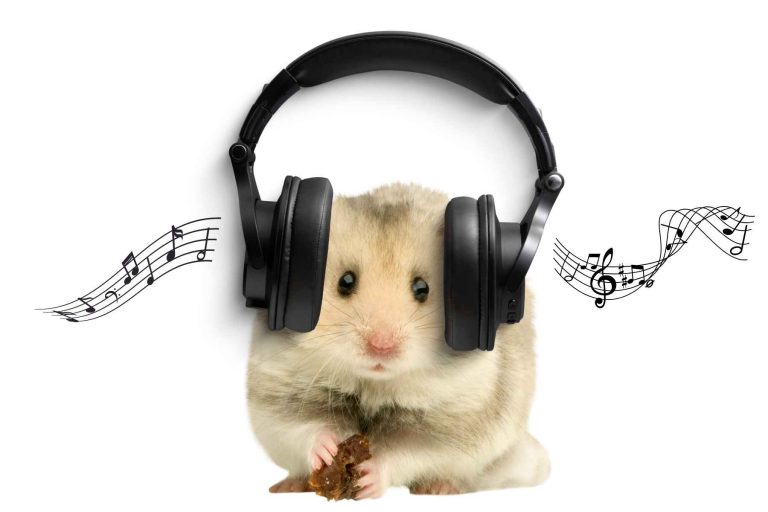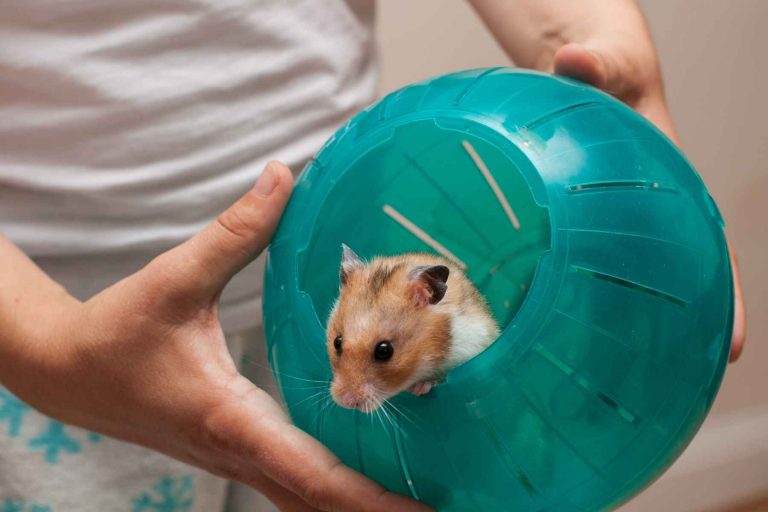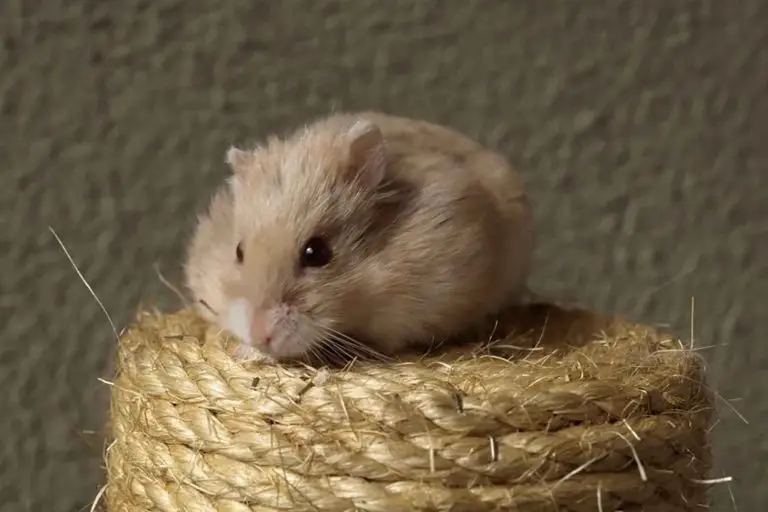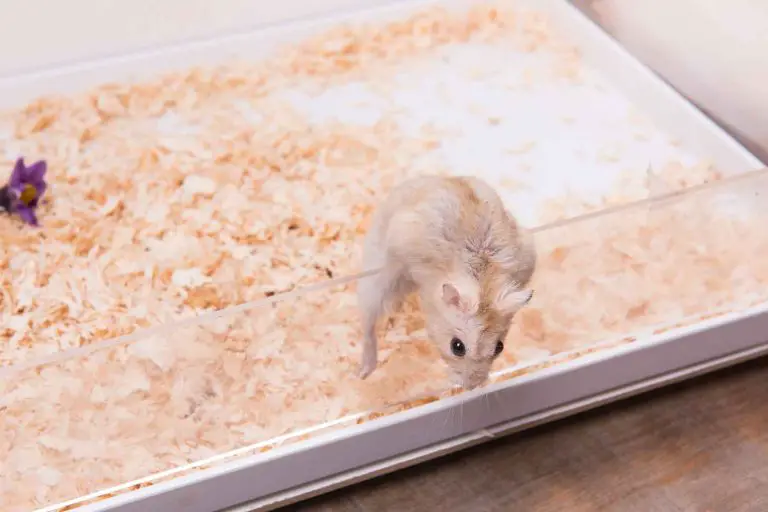Are Hamsters Loud?
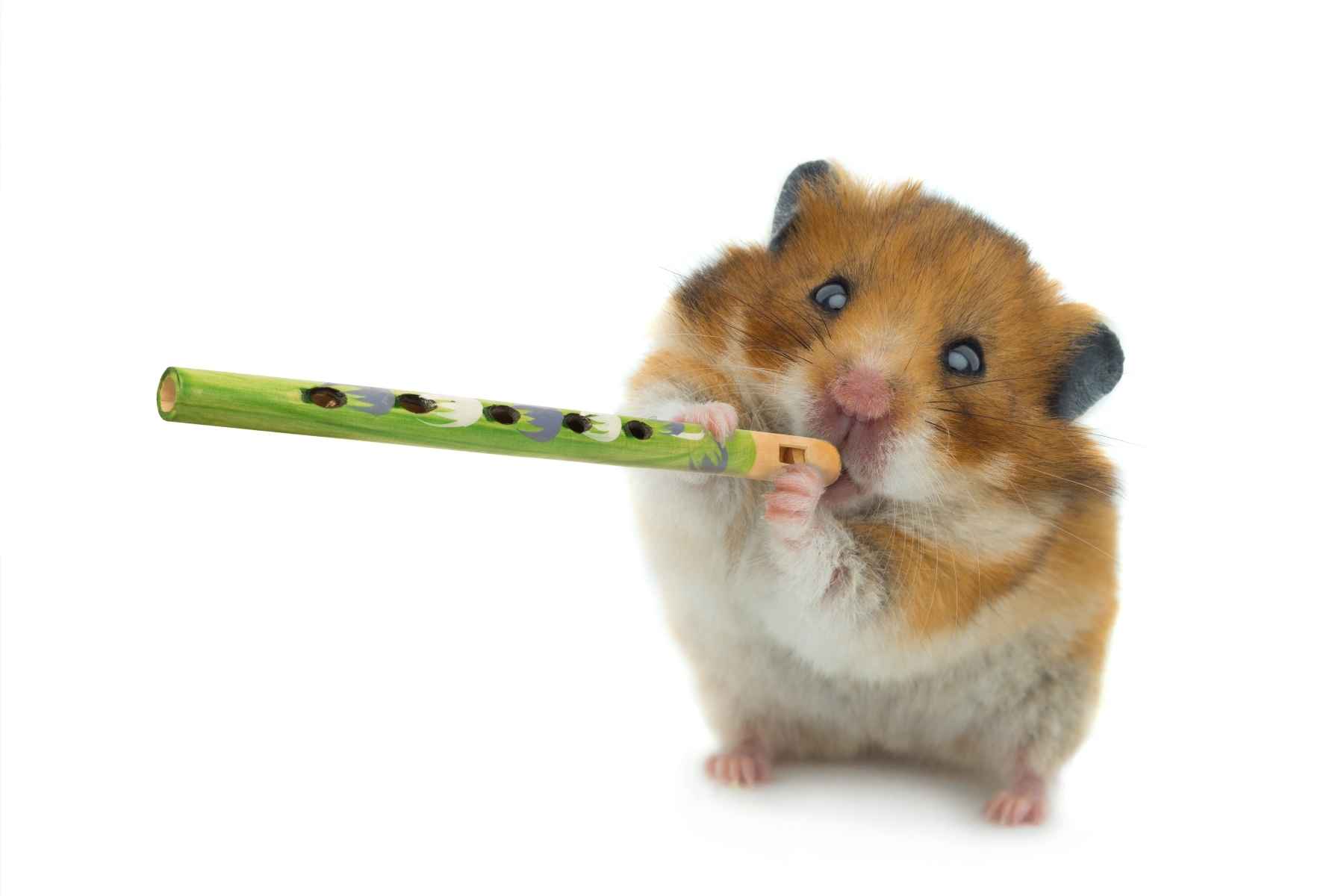
You might know that hamsters squeak just like mice and rats do. But can these adorable rodents get loud enough to keep you up?
Hamsters are ordinarily quiet creatures that don’t vocalize loud enough to bother most people. Although, they can generate significant noise by running on their wheels and chewing on objects. Additionally, hamsters will sometimes make sounds to communicate their mood.
Below, this article delves into how your furry friend might make a racket. And it also covers ways to keep your hamster’s cage a little quieter.
When Are Hamsters Loud?
Despite their tiny size, hamsters can be surprisingly loud. And many owners will attest to how these rodents are particularly noisy at night.
Hamsters are crepuscular animals that stay mostly active at twilight. And unfortunately, that means you’re most likely to hear them when you’re trying to sleep.
Usually, this noise will come from them running on their wheel or gnawing on stuff in their cage.
But thankfully, there are ways to minimize sounds from your pet—such as using silent wheels or switching to a glass enclosure.
While they’re most active during evening and dawn, these rodents can make noise at any time of day. They’ll often quietly squeak and chirp while they explore to indicate contentment. And they may even hiss if they feel agitated.
Additionally, hamsters are sometimes loud when they eat.
The sound of them munching on nuts is typically more cute than annoying. However, your pet might also audibly gnaw on their water dispenser’s metal mouth.
What Noises Do Hamsters Make?
Your furry little friend can make an impressively wide variety of sounds.
Many of these noises are cute, quiet vocalizations. Hamsters will idly squeak and chirp as they roam around their cage. Or even chatter their teeth in some circumstances.
However, they can also use their enclosure and toys to make sounds. And at times, they even cause enough commotion to wake up their owners.
Here are some of the loudest noises your rodent might make:
- Wheel Running: One noise every hamster owner knows well is the sound of their pet’s wheel spinning. Older and unlubricated wheels can even keep light sleepers up at night.
- Vocalizations: Most of your furry pal’s calls are too quiet to notice. However, they might loudly shriek or hiss if they feel stressed out.
- Chewing: Do you have a metal cage or water dispenser? Then your hamster may audibly gnaw on them. This usually sounds like a loud clicking sound.
- Roaming: Your hamster can make a surprising amount of noise just exploring their cage—particularly when climbing or knocking toys over.
How Do Hamsters Make Noise?
Hamsters can make a noticeable amount of racket at times. So naturally, you might wonder how such a tiny critter creates such a clamor.
One way that these critters do it is by bruxing.
Bruxing is a behavior found in all rodents. It occurs when the animals rapidly grind their teeth, creating a “clicking” noise.
This sound is one of the more common and noticeable vocalizations hamsters make. You’ll usually notice them do this when they’re happily exploring. However, it can also mean they’re irritated.
Another way these critters get loud is by playing.
You might not realize it, but hamsters are excellent climbers. So if you have a metal cage, you may hear your pet scaling up the sides.
Additionally, they can make some ruckus while pushing around their toys—especially hanging platforms and swings.
What Hamster Sounds Mean
While not usually loud, hamsters can make lots of different vocalizations. And as an owner, you’ll likely want to know what they say about your furry friend’s mood.
Below are the meanings behind some of the sounds your pet makes:
- Squeaking: These are the most common sounds hamsters make. A single, occasional squeak usually signals contentment. But rapid squeaking may indicate excitement or surprise. Here is an example:
- Screaming: Believe it or not, hamsters can make a loud shriek when scared or hurt. Check on them if you hear this loud call to be safe.
- Hissing: This sound usually means your hamster is feeling very grumpy. It’s a good idea to give them space if you want to avoid getting nipped.
- Cooing and chirping: Soft coos signify a very happy rodent. It may feel like they’re gently vibrating or purring when they make this noise.
- Coughs and sneezes: Hamsters may sneeze and cough due to dust, ventilation issues, or illness. If your pet frequently makes these sounds, consider a trip to the vet.
- Clicking teeth: Teeth chattering can indicate either joy or annoyance in hamsters. Slower, softer clicks typically suggest they’re feeling peppy.
How To Help Your Hamster Stay Quiet at Night
Is your frisky critter keeping you or the kids up at night? If so, there are a couple of ways to minimize the noise.
One of the best and most fun ways to get your pet to relax is to hang out with them.
It may seem counterintuitive at first. However, playing with your furry friend can tire them out and make them less rambunctious.
Another method you can try is moving their enclosure to a calmer part of the house.
Your pet might get stimulated by people walking near them. Or by the sounds and light of a nearby TV. So keeping them somewhere quiet may help them feel less anxious and rowdy.
Finally, remember that hamsters are crepuscular—meaning they’re most active at twilight. As a result, turning off the lights in your pet’s room earlier can jumpstart their routine. By the time you get to bed, they may start calming down.
However, don’t mess with your pet’s schedule too drastically. The last thing you want to do is cause any anxiety.
How To Make Hamster Cages Quieter
Hamsters don’t create too much noise on their own. However, their cages and toys can make a racket at times.
And thankfully, there are several excellent ways to soundproof their enclosures.
Here are some methods to reduce noise:
- Silent wheels: Hamster wheels are probably the loudest thing about these pets. As a result, buying a quieter one may reduce noise. Lubricating older wheels can also make a difference.
- Muffling: Try placing a folded towel or sheet under your pet’s enclosure. Doing so may prevent sound in the cage from echoing off the table or dresser below it.
- Provide chewing toys: Chew toys are a great way to keep your hamster preoccupied. Having something to gnaw on helps them feel less anxious and, by extension, less rowdy.
- Switching enclosures: Your pet can make a lot of noise chewing on the bars of metal habitats. Moving your furry pal to an aquarium or plastic home can remedy this problem.
Consider moving your critter’s cage to another room if nothing else works.
Assuming that’s not possible, playing background noise (like music) may also help. It won’t make things quieter but can at least mask the sounds your pet makes.
Are Some Hamsters Louder Than Others?
There isn’t much evidence to suggest hamster breeds differ much in noise level. The average Robo hamster will likely be just as loud as a Russian dwarf.
On the other hand, your furry pal’s personality can significantly influence their loudness.
Just like humans, each hamster has a unique disposition. One of your rodents might scamper around all day, while the other prefers to nap and relax.
Generally, rambunctious and active hamsters are loudest. After all, running on their wheels and roaming around can make some noise. And hyper critters also tend to be more vocal.
In contrast, docile and lazy hamsters won’t create as much commotion—especially if you play with them often, which helps release their pent-up energy.
You won’t know how loud your pet will be until you bring them home. However, there are always ways to reduce noise if it becomes a problem.
Are Hamsters Sensitive to Noise?
Even though they don’t make much sound, hamsters are hypersensitive to noise. And a big part of the reason why is their ultrasonic hearing.
These rodents can detect high-frequency sounds that humans aren’t able to perceive. You might not notice the hum of your lights or fridge. However, according to the RSPCA, those noises may be loud to your furry friend and stress them out.
Additionally, hamsters can hear sounds far too quiet for humans to pick up. They may even notice things quicker than you do—much like how dogs often bark before we realize someone’s at the door.
So to keep your hamster friend happy, you should try to eliminate excess noise around them.
Firstly, avoid placing your rodent’s enclosure near a television or appliance. The constant noise emanating from these devices may make your furry pal feel anxious.
If possible, also consider putting your pet in a quieter part of the house. Laundry closets and living rooms may stress out sensitive hamsters. Meanwhile, a bedroom or home office can be much more relaxing.
Final Thoughts
Generally speaking, hamsters are quiet critters who don’t make much sound.
These rodents can get loud when running on their wheels or chewing on cage bars. However, you can reduce the noise by soundproofing your pet’s enclosure and toys.


